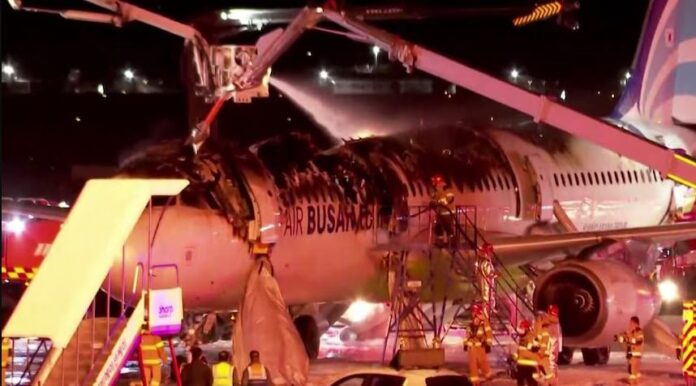Seoul, South Korea – In response to a fire incident involving an Air Busan Airbus A321 at Gimhae International Airport last month, South Korea has announced new aviation safety measures effective from March 1. The new rules specifically target the management of portable batteries on board its national carriers.
The fire, which occurred on January 28 as the plane was preparing for departure to Hong Kong, prompted a nationwide review of battery safety on flights. Now, passengers will be limited to carrying up to five 100-watt-hour portable batteries. Batteries exceeding 160-watt-hours will be prohibited from being brought aboard.
Also Read: Gas Explosion at Taichung Department Store Claims 5 Lives
The Transport Ministry detailed that security checks will now include inspections for the number and type of batteries passengers carry. Additionally, charging portable batteries during flights will be completely banned.
In alignment with Air Busan’s proactive measures announced last week, the ministry has also forbidden passengers from storing power banks and e-cigarettes in overhead cabin bins. This decision aims to mitigate risks associated with lithium-ion battery fires, which can ignite if damaged or defectively manufactured.
“The cause of the fire on the Air Busan aircraft remains under investigation, but these measures are designed to address potential hazards,” the ministry stated, emphasizing the move as a precautionary step for passenger safety.
The fire was initially spotted by a flight attendant in a rear left-hand overhead bin, leading to a swift evacuation of all passengers and crew without harm.
Globally, aviation regulations have long advised against including batteries in checked luggage due to the risk of short circuits causing fires. South Korea’s new measures reflect an intensified focus on cabin safety following this recent incident.
Key Points:
South Korea introduces new aviation safety measures following an Air Busan plane fire.
New rules effective March 1 for South Korean airlines.
Limit on portable batteries: Up to five 100-watt-hour batteries allowed; over 160-watt-hour batteries banned.
Security checks to include battery number and type verification.
Charging batteries on flights prohibited.
Power banks and e-cigarettes banned from overhead bins, following Air Busan’s lead.
Measures aim to prevent battery-related fires, though the cause of the Air Busan incident is still under investigation.
All passengers evacuated safely after the fire was detected in an overhead bin.



